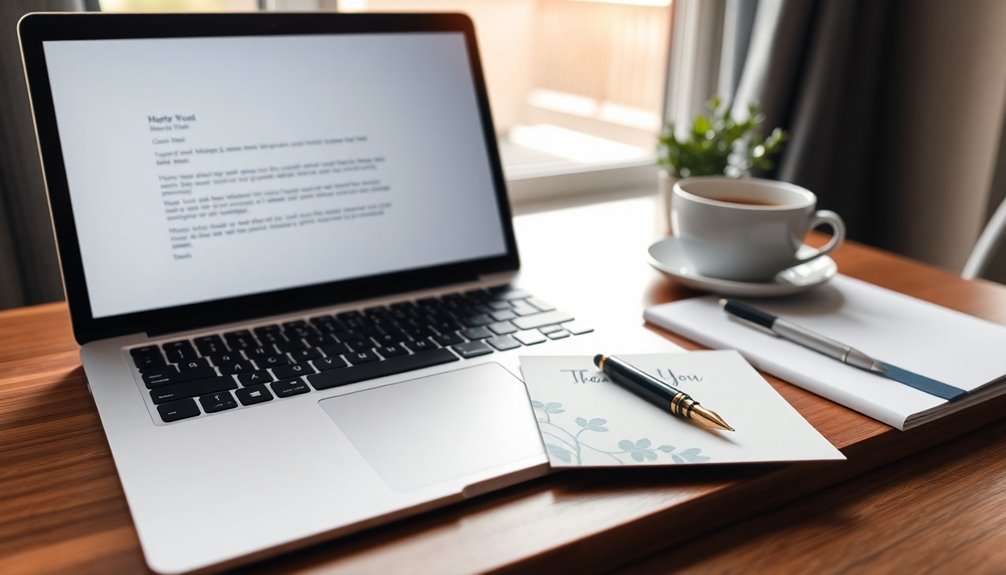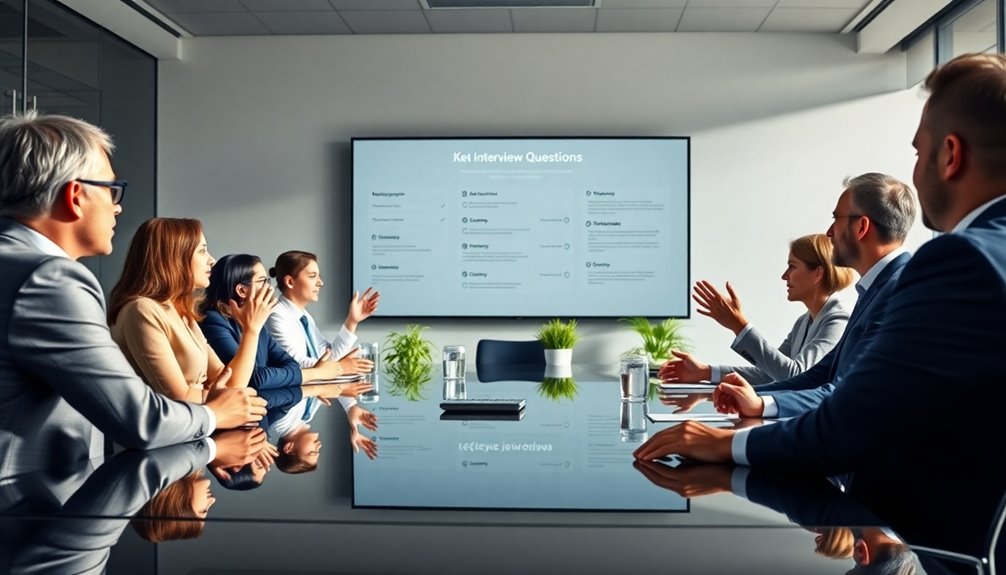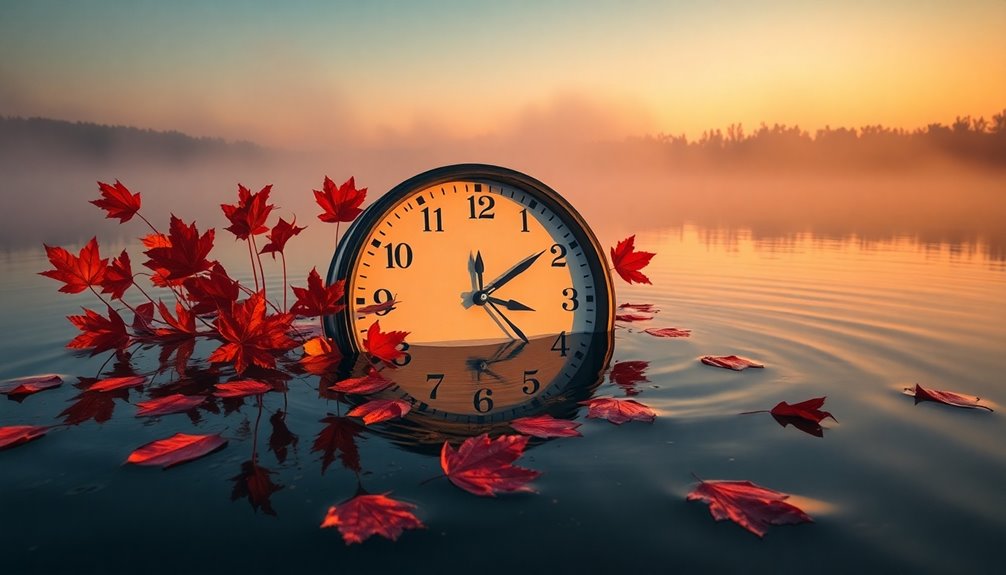Sending a thank-you note after your job interview is essential to make a lasting impression. It shows your professionalism and reinforces your interest in the position. Keep it personal by referencing specific topics from the interview, and aim for brevity—about 80 to 150 words is ideal. Timing matters too; send your note within 24 hours for maximum impact. Consider creating templates for different scenarios, such as Zoom interviews or multiple interviewers, to maintain consistency. If you want to discover effective templates that can help you stand out even more, there's plenty more to explore.
Key Takeaways
- Personalize your thank-you note by referencing specific topics discussed during the interview to create a meaningful connection.
- Keep your message concise, ideally between 80-150 words, to maintain the reader's engagement.
- Send your thank-you email within 24 hours to demonstrate promptness and genuine interest in the position.
- Address each interviewer individually to acknowledge their contributions and tailor your message to their expertise.
- Maintain a professional tone and proofread for errors to ensure a positive impression and showcase your attention to detail.
Importance of Thank-You Notes
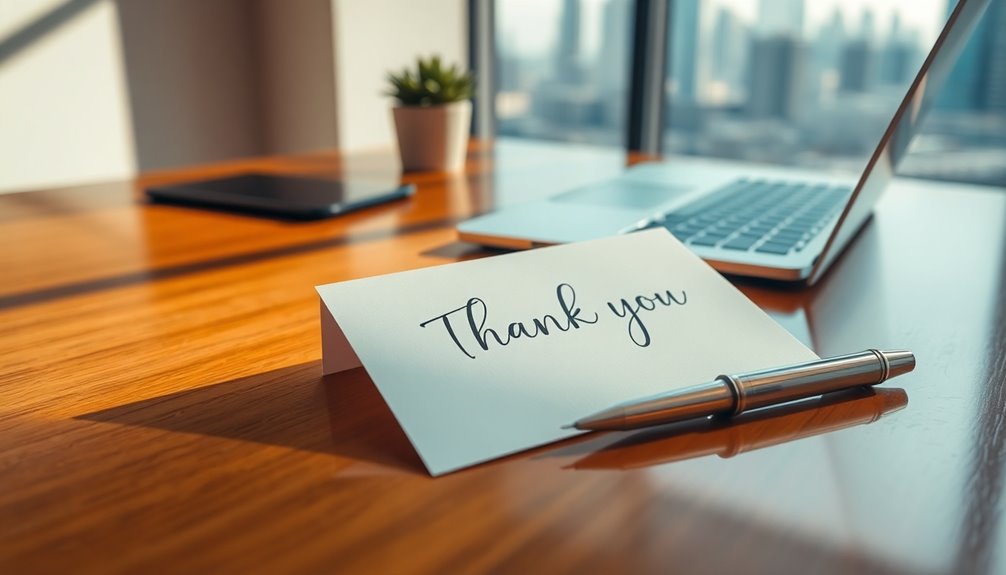
Thank-you notes are a crucial element of the job interview process. Sending a thank-you email within 24 hours of your interview is a best practice that hiring managers appreciate. In fact, 80% of them find these notes helpful in the hiring process. A timely note not only reinforces your interest in the position but also showcases your professionalism.
Moreover, thank-you notes offer a chance to clarify misunderstandings that may have arisen during the interview and to reiterate your qualifications for the role. If you fail to send a thank-you note, you risk being overlooked, as it might imply a lack of interest or professionalism on your part.
Additionally, expressing gratitude through a thank-you note strengthens professional relationships. Even if you don't land the job this time, a well-crafted note can keep you top of mind for future opportunities. By taking the time to send a thoughtful thank-you note, you demonstrate your commitment and respect for the hiring process, making you a standout candidate in their eyes. So, don't underestimate the power of a simple thank-you note; it could be your ticket to future success.
Best Practices for Writing
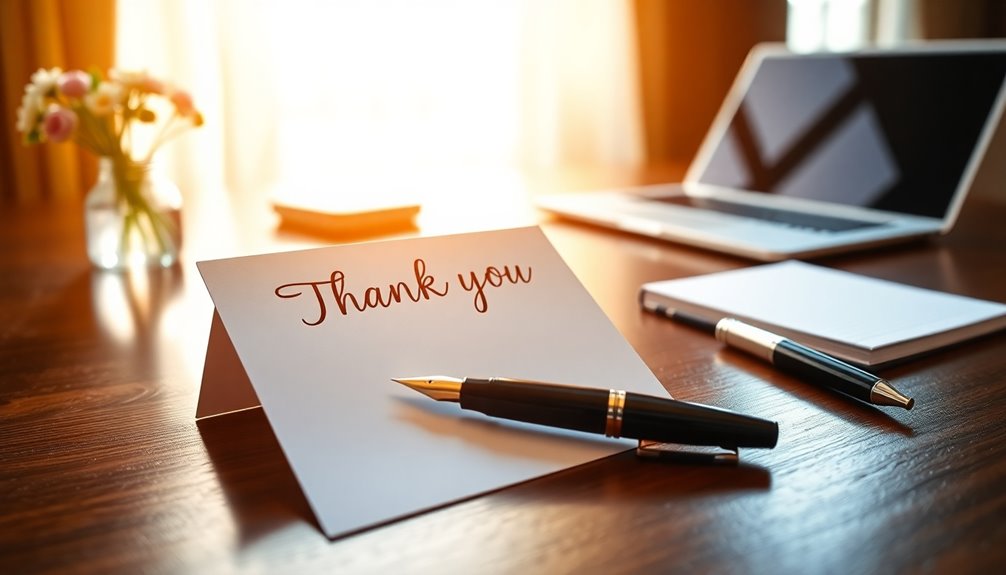
When writing your thank-you note, personalize it by referencing specific topics from your interview; this shows you were engaged and truly interested. Keep it concise, ideally between 80-150 words, to respect the interviewer's time while still expressing your appreciation. A clear subject line and error-free writing are essential for making a positive impression.
Personalization Enhances Impact
Crafting a personalized thank-you note after your job interview can considerably elevate the impact of your message. Personalization in thank-you emails shows your genuine interest and attention to detail, which 80% of hiring managers appreciate. By referencing specific topics or questions discussed during the interview, you reinforce your skills and experience while creating a memorable connection with the interviewer.
Incorporating unique insights you gained from the conversation can set your note apart from generic responses. Not only does this demonstrate critical thinking, but it also reflects a proactive attitude that hiring managers value. Tailoring your message to align with the company culture makes it more relatable, enhancing engagement with the recipient.
Furthermore, personalization guarantees your professionalism shines through, helping you build rapport. This connection keeps you top of mind for future opportunities within the organization. Remember, a well-crafted thank-you note is more than just a polite gesture; it's a strategic tool that can leave a lasting impression. By investing time in crafting tailored messages, you enhance your chances of being remembered positively by the interviewer.
Clarity and Conciseness Matter
Writing a thank-you note after your interview doesn't have to be complicated. A well-crafted thank you email should be concise, ideally between 80-150 words. This respects the interviewer's time and guarantees your message gets read. Here are some best practices to enhance clarity and professionalism:
- Use a clear subject line: Include your name and the position to facilitate easy identification.
- Express my gratitude genuinely: Start with a heartfelt thank you for the opportunity and the interviewer's time.
- Highlight key points: Reference specific discussions from the interview to demonstrate your attentiveness and qualifications.
- Reiterate your enthusiasm: Convey your excitement about the role to reinforce your interest.
- Consider your financial health: A personal budget can help manage expenses during your job search and beyond.
Timing for Sending Thank-You Notes
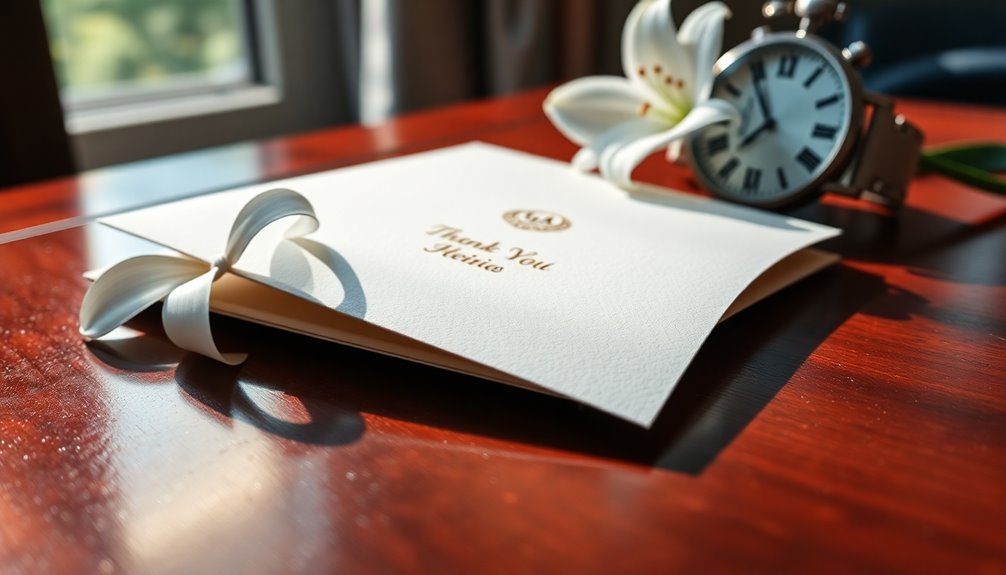
Timing plays an essential role in the effectiveness of your thank-you note after a job interview. To maximize its impact, you should send your thank-you email within 24 hours. This quick response demonstrates promptness and shows your enthusiasm for the position. Draft your note shortly after the interview while the details are still fresh in your mind, as this enhances personalization and makes your message more memorable.
Avoid sending your thank-you note during weekends or holidays; timing is vital to guarantee your email arrives during standard business hours. If you send your note within 48 hours, it can still retain some effectiveness, but delays beyond this timeframe may diminish its impact.
If you haven't heard back after one week, it's appropriate to follow up. This gives the hiring team adequate time to evaluate candidates while keeping your name fresh in their minds. Remember, a well-timed thank-you note can set you apart from other candidates, so prioritize getting it out promptly and thoughtfully. By doing so, you reinforce your interest and professionalism, making a lasting impression.
Formats for Thank-You Emails
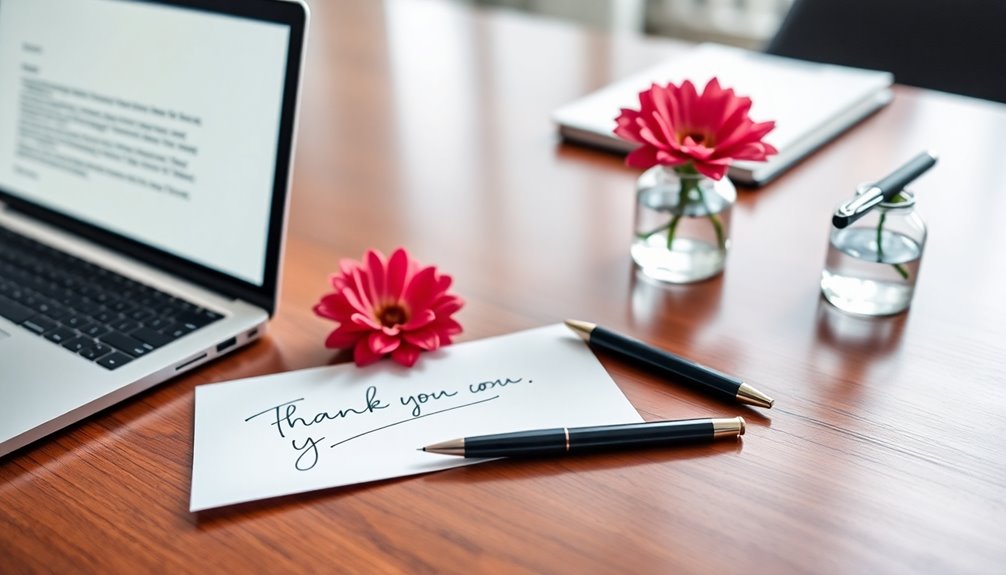
Sending your thank-you note promptly is just the beginning; how you format it can make a significant difference. A well-structured email after an interview can reinforce your interest and professionalism. Here are some key formatting tips to bear in mind:
- Keep it concise: Aim for 80-150 words to respect the interviewer's time.
- Personalize your note: Reference specific points discussed during the interview to make your message memorable.
- Use clear subject lines: Opt for something straightforward like "Thank You for the [Position Title] Interview" to make sure it stands out.
- Maintain professionalism: Stick to standard fonts like Arial or Times New Roman, and proofread to avoid errors.
In your email, express gratitude for the opportunity to discuss the role, and please feel free to mention any next steps. You might say, "I appreciate you taking the time to meet with me," and reiterate your excitement about the position. By crafting a thoughtful, professional email, you enhance your chances of leaving a lasting impression. A personalized note can set you apart in a competitive job market.
Short Thank-You Email Template
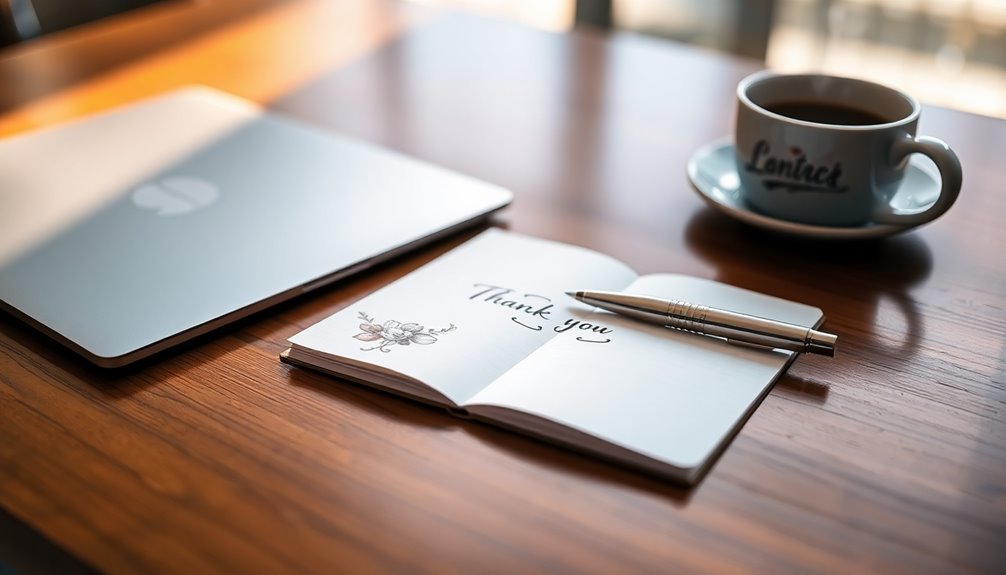
Conclude your email by offering to provide additional information if needed. A simple line such as, "If you need any further details, please let me know," reinforces your willingness to assist. Finally, wrap up your message with a polite sign-off, such as "I look forward to hearing from you soon." This concise email not only shows your appreciation but also keeps you fresh in the interviewer's mind.
Specific Thank-You Email Template
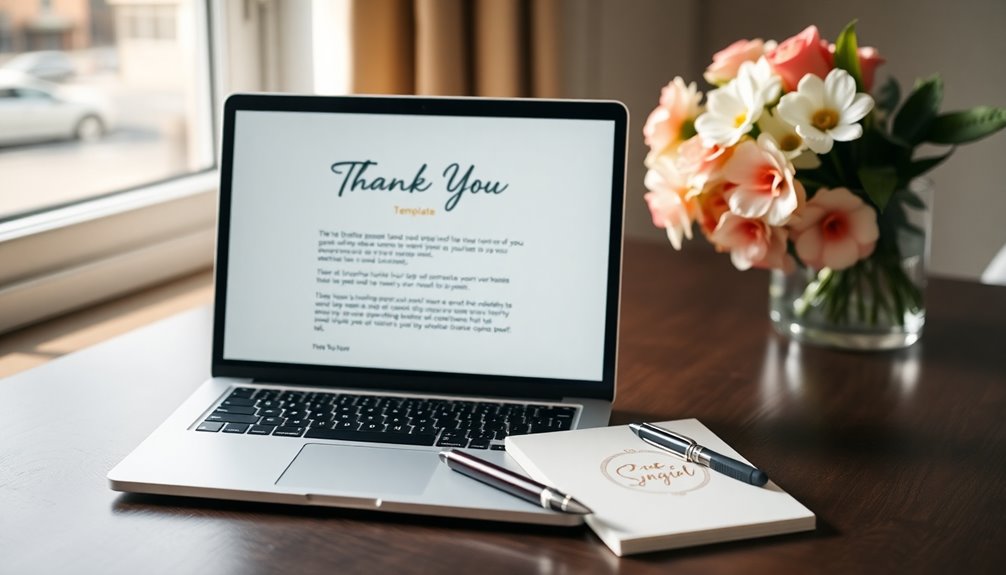
A specific thank-you email template can make a lasting impression after your interview. It allows you to express gratitude and reinforce your connection with the interviewer. Here's how to craft an effective thank-you email:
- Personalized greeting: Address the interviewer by name to create a personal touch.
- Express gratitude: Thank them for the interview opportunity and their time.
- Highlight skills: Reference specific skills that align with the company's needs, showcasing your fit for the role.
- Reiterate enthusiasm: Share your excitement for the position and the organization.
When writing, consider a clear subject line, such as "Thank You for the Interview Opportunity for [Position Name] – [Your Name]." Keep your email concise, ideally between 80-150 words, to respect the interviewer's time. Always proofread your email to eliminate any typos or grammatical errors, ensuring professionalism in your communication.
This approach not only conveys your appreciation but also reinforces your qualifications and enthusiasm for the role. A well-crafted thank-you email can be the final touch that sets you apart from other candidates.
Zoom Interview Thank-You Template

When you finish a Zoom interview, taking the time to send a thank-you email can greatly enhance your chances of leaving a positive impression. Aim to send your thank-you note within 24 hours to demonstrate promptness and professionalism. Start with a clear subject line, like "Thank You for the Zoom Interview," to guarantee your email is easily identifiable.
In your email, express gratitude for the opportunity to interview and mention specific topics you discussed. This personal touch reinforces the connection you made with the interviewer and shows that you were engaged during the conversation. Keep your message concise—ideally between 80-150 words—focusing on your enthusiasm for the role and the company.
Maintain a professional tone throughout the email, avoiding overly casual language. You might say something like, "I appreciate the insights you shared about the team's goals, and I'm thrilled about the possibility of contributing to such an innovative project." Finally, conclude by offering to provide any additional information if needed, reinforcing your eagerness and willingness to follow up. This thoughtful approach can set you apart from other candidates.
Follow-Up Email Template
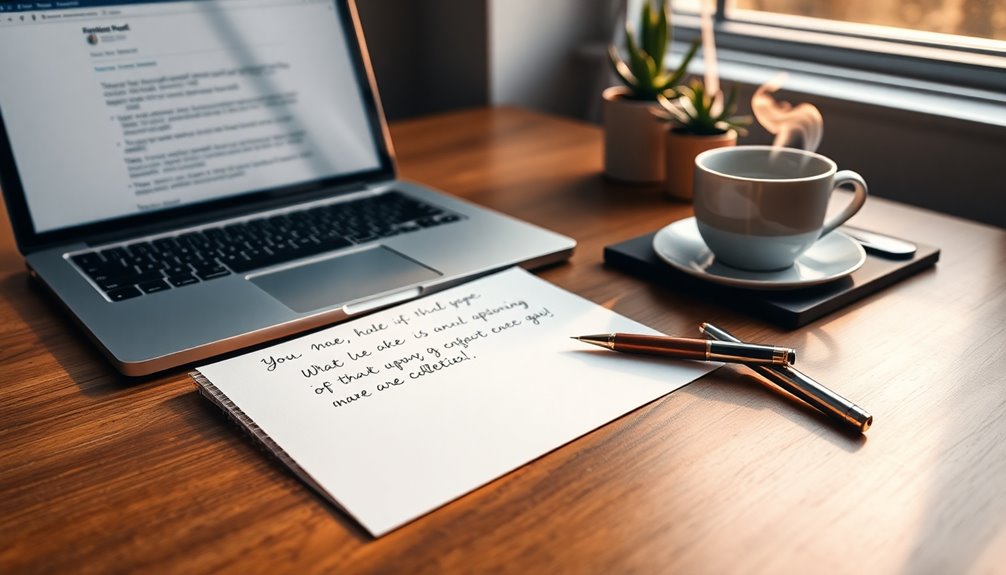
Sending a follow-up email after your interview is essential for showing your continued interest in the position. Aim to send it within a week if you haven't heard back; this timing keeps you fresh in the interviewer's mind. By reaching out promptly and professionally, you reinforce your enthusiasm and commitment to the role.
Importance of Follow-Up
Follow-up emails are an important part of the job interview process, showcasing your ongoing interest in the position. A well-crafted follow-up can greatly bolster your chances of landing the job. It demonstrates professionalism and respect for the hiring manager's time, while also providing an opportunity to become memorable.
Here are a few reasons why sending a follow-up email is essential:
- Reinforce qualifications: Use this chance to reiterate how your skills align with the role.
- Clarify points: If any part of the interview was misunderstood, this is your moment to set the record straight.
- Positive influence: Studies show that 80% of hiring managers appreciate follow-up emails, which can sway their decision-making.
- Thank-you note can help: Expressing gratitude further emphasizes your continued interest and keeps you top-of-mind. Additionally, sending a follow-up email can help in rebuilding trust with the hiring manager after the interview process.
Timing for Sending Emails
Timing is key when it comes to sending your thank-you email after an interview. To maximize its impact, aim to send a thank-you email within 24 hours post-interview. This promptness not only shows your appreciation but also reinforces your enthusiasm for the role. If you miss that window, sending it within 48 hours can still be beneficial, but delays beyond that may reduce effectiveness.
Here's a quick guide on timing:
| Timeframe | Action |
|---|---|
| Within 24 hours | Send a thank-you email |
| Within 48 hours | Still beneficial, but less ideal |
| Typical office hours | Guarantee it's seen promptly |
| After one week | Follow up if no response |
| Keep top of mind | Stay relevant to hiring managers |
Thank-You Email for Multiple Interviewers
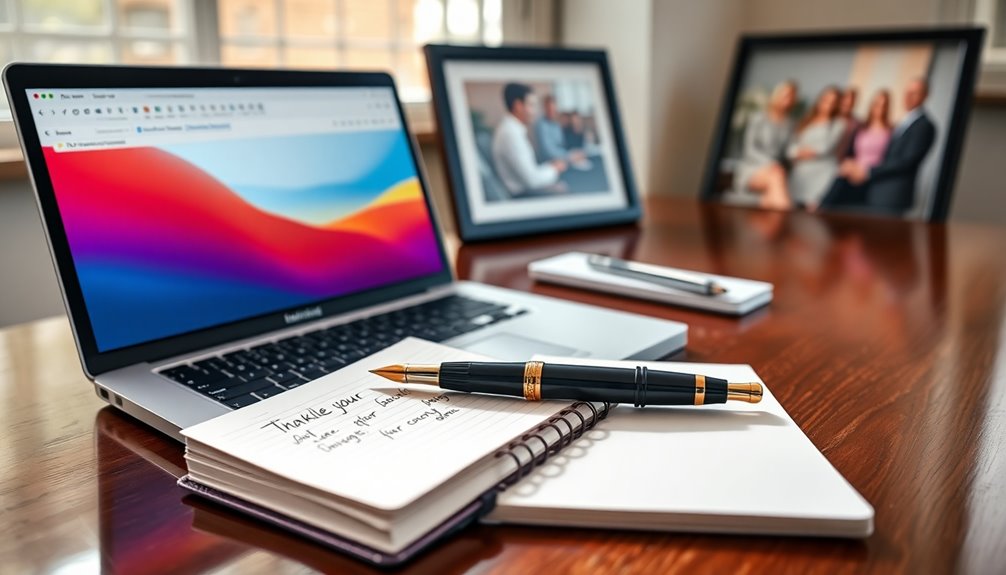
Crafting a thank-you email after interviewing with multiple interviewers can really set you apart from other candidates. When you address each interviewer individually, you personalize the message, showing genuine appreciation for their contributions. Sending your thank-you emails within 24 hours guarantees your gratitude feels fresh and reinforces your interest in the position.
Here are some tips to help you create an effective thank-you email:
- Address each interviewer: Acknowledge their specific roles and insights during the interview.
- Include specific points: Reference topics discussed that relate to each interviewer's expertise, demonstrating your attentiveness.
- Highlight collective effort: Recognize the team dynamic and the important role each interviewer plays in the decision-making process.
- Reinforce your fit for the role: Clearly articulate how your skills align with the needs discussed during the interview.
Additionally, showing effective communication can greatly enhance your chances of leaving a positive impression.
Common Mistakes to Avoid
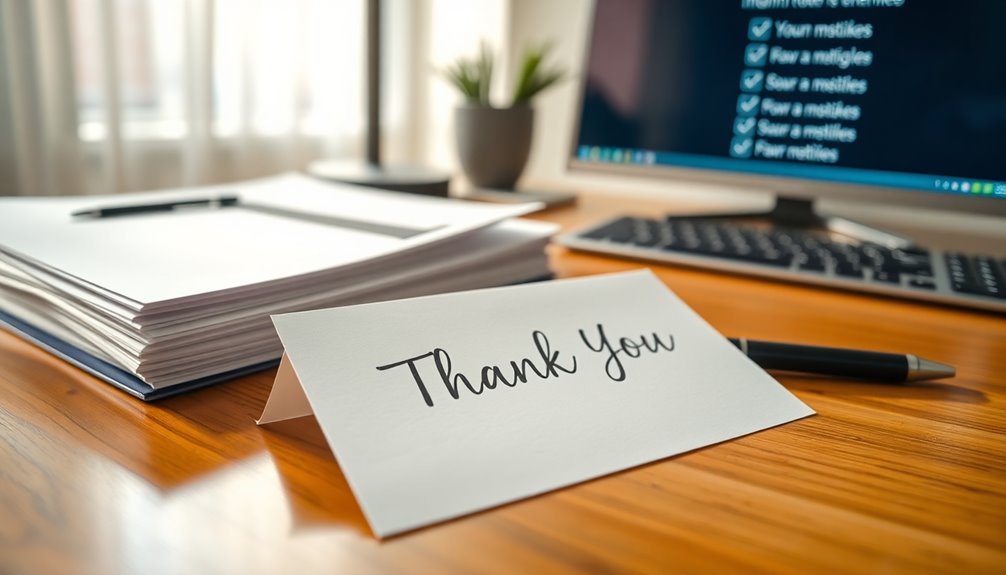
Sending a thoughtful thank-you email is important, but it's easy to make mistakes that can undermine your effort. One common error is failing to personalize your message. Always include specific references to the interview conversation to show genuine interest and engagement. Also, don't wait too long to send your thank-you email; aim to do it within 48 hours. Sending too late can imply disinterest in the role.
Be cautious about your language. Using overly casual language can create a negative impression, so make sure you maintain a formal tone throughout. This reflects respect for the interviewer and the position you're seeking. Additionally, don't forget to proofread your email. Spelling and grammatical errors can undermine your professionalism and suggest carelessness.
Lastly, avoid focusing solely on personal gain. Instead, highlight how your qualifications align with the company's needs. This approach demonstrates that you're not just interested in the job for yourself, but also how you can contribute to the organization. By steering clear of these common mistakes, you'll enhance the impact of your thank-you email and leave a lasting impression.
Frequently Asked Questions
How Do You Write a Good Thank You Note After an Interview?
To write a good thank-you note after an interview, send it within 24 hours to show your enthusiasm. Personalize your message by referencing specific topics you discussed, which reinforces your connection. Keep it concise, ideally between 80-150 words, to respect the interviewer's time. Use a clear subject line for easy identification. Finally, proofread for errors, maintain a professional tone, and include your contact information for follow-up.
What Is an Example of a Thank You Letter for a Job Interview?
To craft a thank-you letter after your job interview, start by expressing genuine gratitude for the interviewer's time. Mention specific topics you discussed to personalize your message. Reiterate how your skills align with the position and convey your enthusiasm for the role. Keep it concise, and use a clear subject line like "Thank You for the Interview." Sending this within 24 hours can greatly enhance your chances of making a positive impression.
How Does a Thank You Letter Help You Stand Out From Other Candidates After an Interview?
A thank-you letter helps you stand out by showing your professionalism and enthusiasm for the role. When you personalize the note by mentioning specific topics from the interview, it demonstrates your engagement and reinforces your fit for the position. This thoughtful gesture can leave a lasting impression on hiring managers, making them more likely to remember you favorably. Ultimately, it enhances your professional reputation and could influence future opportunities, even if you're not selected this time.
How Do You Thank You for Giving Me the Opportunity to Attend the Interview?
You can thank them for the opportunity by expressing your appreciation directly in a follow-up message. Mention how much you enjoyed the interview and highlight specific aspects that resonated with you. Keep it brief yet sincere, letting them know you value their time and consideration. A simple yet heartfelt note can make a big difference, showing your enthusiasm for the role and your respect for the interview process.
Conclusion
Sending a thank-you note after your job interview isn't just polite; it can also greatly boost your chances of landing the job. In fact, studies show that 80% of hiring managers appreciate a thank-you note, and it can set you apart from other candidates. So, take a moment to express your gratitude and reinforce your interest. By doing this, you're not only showcasing your professionalism but also leaving a lasting impression. Go ahead and stand out!
Felicity, our Author, pens in-depth articles and guides that delve into the heart of personal discovery. Her narrative-driven approach weaves together theory, practice, and personal anecdotes, making the journey of self-exploration both relatable and inspiring. Felicity’s contributions help illuminate the path for those seeking a deeper understanding of themselves and their relationships.
